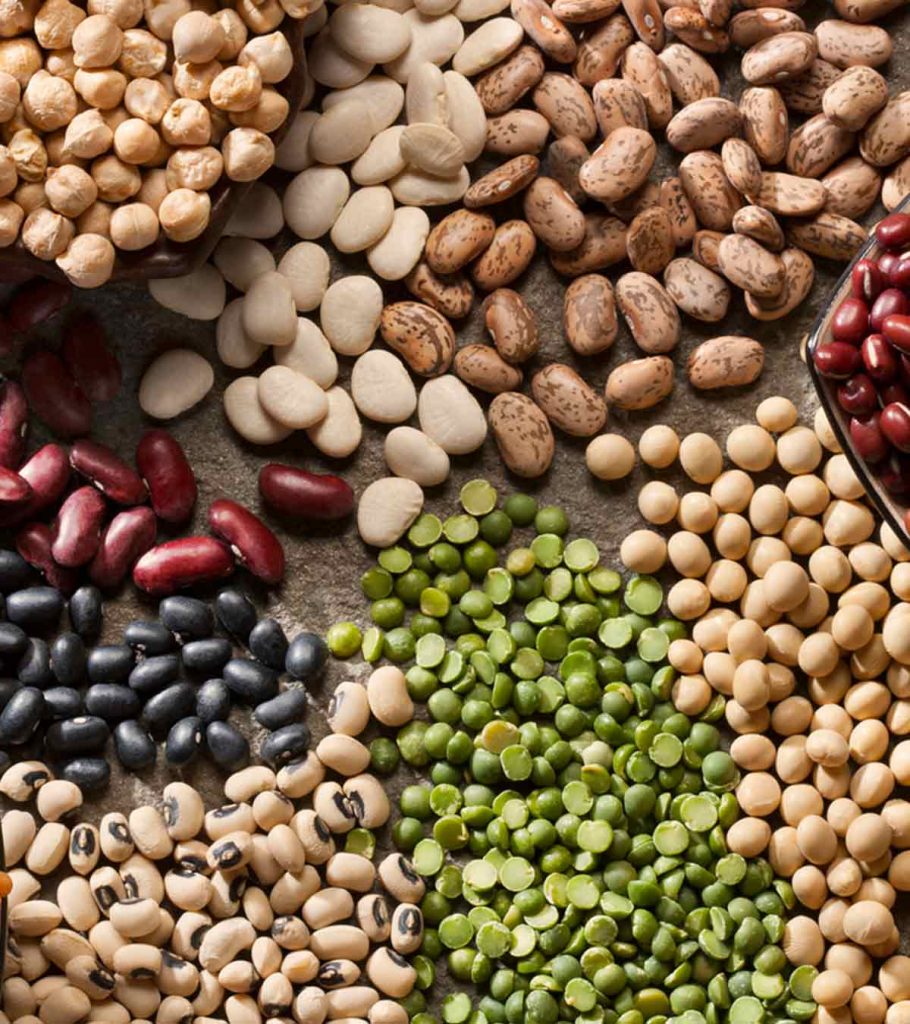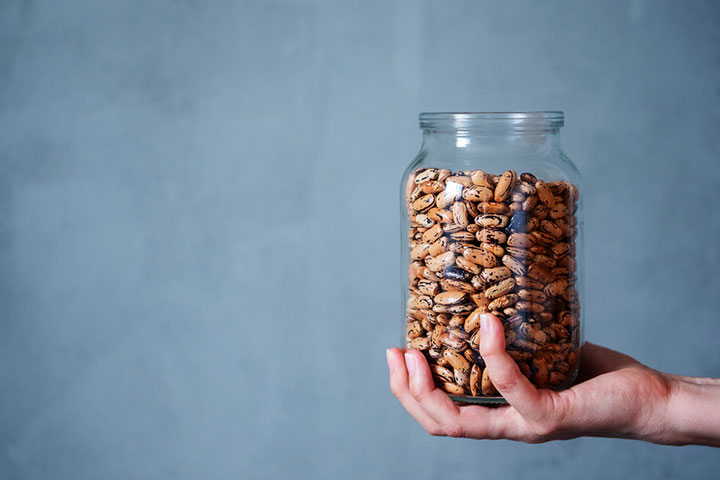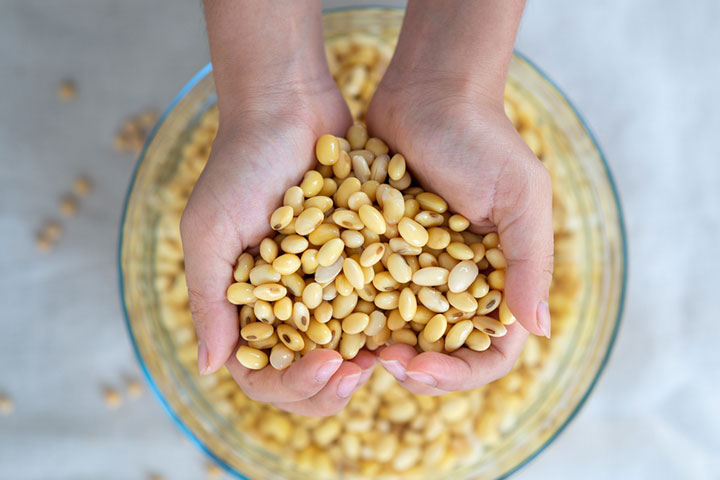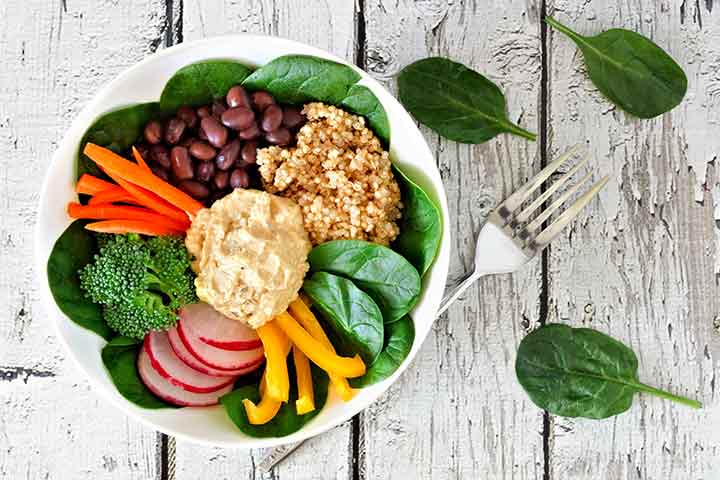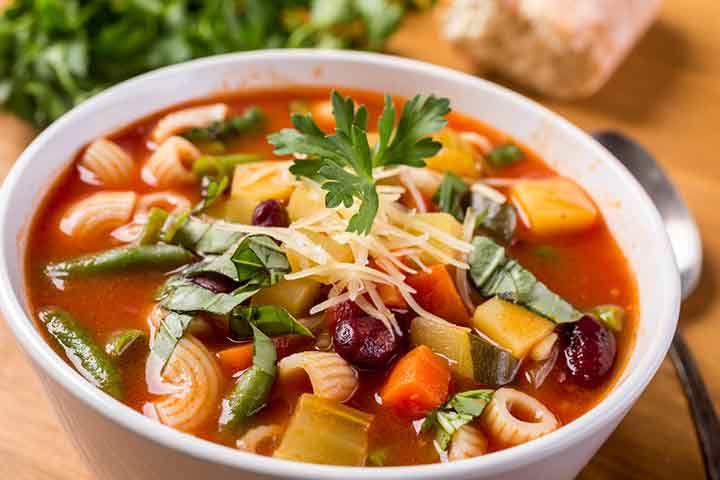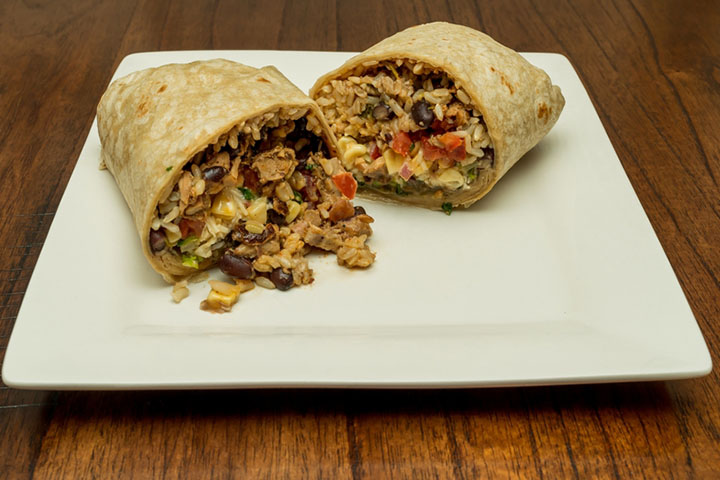A breastfeeding mother should consume healthy food as the nutrients pass on to the baby required for growth and development. If you are not sure about including beans when breastfeeding, we are here to help you. Beans belong to the Fabaceae family and are a rich source of fiber, proteins, phytochemicalsiXNaturally occurring compounds in plants that provide health benefits to humans., and important micronutrients. Therefore, including beans in a breastfeeding mother’s diet is considered healthy and beneficial for infant health. Read on to know about the health benefits of beans and their potential side effects while breastfeeding.
Is It Safe For Breastfeeding Mothers To Eat Beans?
Yes, it is safe for nursing moms to consume beans as a part of their balanced breastfeeding diet, especially if they follow a plant-based diet, such as a vegan or vegetarian diet. Women are recommended to consume an additional 25g/day protein during the lactation period (1). Nursing mothers are recommended to include at least two to three servings of protein-rich foods, like beans, in their daily breastfeeding diet (2).
Possible Health Benefits Of Beans When Breastfeeding
Beans can help you fulfill your dietary requirements in the following ways:
- Rich in nutrients: Besides being rich in protein, beans are an excellent source of dietary fiber, phytochemicals, and micronutrients, such as folate, calcium, and iron (3). It also contains trace amounts of vitamin C and vitamin B6 (pyridoxine).
- Makes a meal wholesome: Beans contain considerable amounts of lysineiXAn amino acid that plays a vital role in regulating calcium absorption, collagen formation, and several other functions in the body., an essential amino acid that helps supplement the nutritional composition of cereals, which lack lysine (4). Therefore, adding beans to cereals (whenever possible) is considered a good choice that can help promote healthy eating.
- May help in weight management: Research studies show that foods, such as beans that are rich in dietary fiber and protein, could possibly help in weight loss (5) (6). Dietary fiber and protein regulate hunger, control overeating, and thus help reduce/manage weight (7).
- Can support digestion: Beans contain – both insoluble and soluble fiber (8). The insoluble fiber adds bulk to the diet and helps in relieving constipation. Germinated beans are more effective than the non-germinated ones.
- May enhance gut health: Research studies show that the indigestible carbohydrates and phenolic compounds present in beans might help in maintaining healthy gut microbiotaiXA group of microorganisms that colonize the gut and promote digestive and overall health. (9). However, more research is needed to reaffirm the findings.
- Help manage diabetes:Beans are low-GI (glycemic index)iXA measure of how quickly specific foods (containing carbohydrates) may raise the blood sugar levels. foods with a considerable amount of soluble fiber and digestion resistant starch that help maintain blood sugar levels (4) (10). Beans, when made a part of a well-balanced postpartum diet, may help in the management and prevention of type-2 diabetes.
- Supports heart health: Some research studies show that regular consumption of beans may help lower the risk of cardiovascular diseases (11) due to total fiber content and certain bioactive compoundsiXNatural components found in both plants, animals, and microbes that have therapeutic properties. like polyphenols (3). A WHO report highlighted that 38% of the 17 million premature fatalities due to noncommunicable diseases were attributed to cardiovascular diseases. This highlights the seriousness of heart-related issues globally. Hence, including beans in the diet may help reduce the risk of heart conditions.
- Overall health: Besides nutritional properties, beans are known to possess antioxidant and anti-inflammatory properties that are anecdotally believed to treat problems, such as eczemaiXA skin condition that causes itchy, red, and scaly patches on the skin due to various factors such as allergies, genetics, or stress., burns, acne, dysentery, and rheumatism (3).
Possible Side-effects Of Beans When Breastfeeding
The following are some of the possible side-effects of consuming beans.
- Might cause gastrointestinal issues: Raw dried beans are considered a gas-causing food due to the presence of non-digestible sugars, such as raffinose. This complex sugar does not get digested in the human gut, thus leading to flatulence and bloating in some individuals. Soaking, fermenting, germination, and cooking can reduce the gas-causing effect of beans to an extent (12).
- Might cause poor mineral absorption: Beans contain certain antinutrients such as tannins and phytic acid. Antinutrients are non-nutritional compounds that reduce the bioavailabilityiXThe rate and extent at which a substance is available for absorption and assimilation in the body. of minerals by reducing their absorption in the body (13).
- Could be toxic for some: The majority of the beans are safe to consume. However, there are some types that contain toxins. For example, fava beans contain toxins that affect individuals with G6PD deficiency. In such individuals, the consumption of fava beans could lead to anemia (Favism) caused by the destruction of red blood cells (RBCs) (14).
Precautions To Take While Consuming Beans
Here are some simple precautions you may take to avoid any unpleasant experience while consuming beans (8).
- Prefer organic beans purchased from a trusted brand.
- Choose packed beans over loose ones as the latter are more prone to contamination.
- Even when packed, look for clean, firm, and whole dried beans. Buy a quantity that you will consume within six months.
- If you are using dried beans, then keep them packed in an airtight container. Store the canned beans in their original sealed can and inside the refrigerator. Once the seal is broken, consume them within the stipulated time.
- Frozen canned beans are cooked; hence thaw them in the microwave. Thawed cooked beans can be consumed straight from the can. However, before use, rinse them thoroughly to remove all the excess salt.
- Cooked beans may be refrigerated in a covered container for up to five days. However, using them earlier is better.
- If you soak beans, especially kidney beans, before cooking place, them in the fridge.
In addition, follow some cooking tips to reduce the gassy effects of beans.
Cooking tips
- Before cooking, clean the beans thoroughly to discard any foreign objects like small stones. Throw away any dry beans that are discolored, shriveled, or broken. Clean the remaining beans with cold water.
- Cleaned beans should be soaked before cooking. Soaking helps soften the dry beans, thus reducing the time spent in cooking. Besides, it helps in the removal of antinutrients in considerable amounts.
- Soaking can be done either in cold or hot water. After soaking, rinse beans and cook them in freshwater.
- Upon soaking, beans rehydrate to at least two to three times their dry size. Thus, be sure to soak the beans in a large pot.
- Do not add baking soda to beans. Baking soda robs the beans of the B-vitamins, such as thiamin, and may also affect the flavor of cooked beans.
- Acidic ingredients, such as lemon juice, tomatoes, wine, vinegar, etc. prevent beans from getting tender. Therefore, add these ingredients after the beans are cooked.
- Add salt after beans are fully cooked and tender. Adding salt before may cause bean skins to become impermeable, thus ceasing the tenderizing process.
These cooking tips help you get the most of the various nutrients while also reducing the effects of antinutrients and indigestible sugars.
Bean Recipes For Breastfeeding Moms
Some of the common beans that you may consider during your lactation period are lima beans, kidney beans, black beans, garbanzo beans, soybeans, pinto beans, fava beans, and navy beans.
1. Hummus
Hummus is a homemade dip, spread, or savory dish prepared from cooked and mashed chickpeas or garbanzo beans. Chickpeas are a good source of protein, fiber, vitamins, and healthy fats like PUFA. Regular consumption of hummus has shown potential health benefits (15). You can add it to your regular breastfeeding diet with salads, breadsticks, pitta bread, garlic bread, or graham crackers.
You will need:
- 1 cup chickpeas (cooked)
- 1/2 cup fresh lemon juice
- 1/2 cup tahini sauce
- 2 roasted garlic cloves (minced)
- ¼ cup parsley (freshly chopped)
- 4tbsp extra virgin olive oil
- 1/2tsp cumin powder
- Salt to taste
How to:
- Add the tahini sauce and lemon juice in a blending cup. Blend the ingredients for one minute or until you see a smooth paste. You can blend the mix for an additional 30 seconds to get a fluffy paste.
- To the above mix, add two tablespoons of olive oil, garlic, cumin, and some teaspoon of salt. Blend all the ingredients for 30 seconds. Scrape the sides and bottom of the bowl and then blend for an additional 20-30 seconds until you see a well-blended mixture.
- Add half of the cooked chickpeas to the blender and blend them with the mixture for about one minute. For this step, you may cook the dry-packaged chickpeas at home, or you may also try canned chickpeas.
- Scrape sides and bottom of the bowl, then add remaining chickpeas and blend until you see a thick and smooth paste. Do not blend for long if you like it chunkier.
- You may add water to adjust the consistency if you do not like thick hummus. Check and add more salt if required at this stage.
- Garnish hummus with a drizzle of olive oil and freshly chopped parsley. Serve right away with fresh homemade salad or bread of your choice.
- Store the leftover hummus in an airtight container and use it within a week.
2. Mixed bean soup
Bean soup is not only filling and soulful but is also nutritionally sumptuous (16). To prepare a mixed bean soup, you can select any combination of beans with a wide assortment of seasonal vegetables, green leafy vegetables, and fresh organic herbs. Some herbs are known to have lactogenic properties that could support breast milk production. However, it is advisable to consult a breastfeeding specialist before using them.
You will need:
- 1cup mixed dried beans (cooked and mashed)
- 1 cup mixed vegetables (carrot, capsicum, spinach, broccoli, brussels sprouts, potato)
- 1 cup onion (diced)
- 1 cup tomatoes (diced)
- 1 cup celery (chopped)
- 1tsp parsley flakes (dried)
- 2 roasted garlic cloves (minced)
- 1tsp thyme (dried and crushed)
- 2 bay leaves
- Salt, to taste
- Pepper powder, to taste
How to:
- Take a thick bottom pan and add two tablespoons of oil. Once the oil is heated, add bay leaves to it. Let the bay leaves crackle.
- Now put onions and fry them until they turn golden brown. Add diced tomatoes and salt. Cook until the tomatoes are soft and mushy.
- Now add all the vegetables and mix everything well. Add water till all the vegetables are immersed. Cover the pan and let the vegetables cook on low heat.
- Keep checking the vegetables every seven to eight minutes. Once vegetables are cooked, add mashed chickpeas to the mix.
- Let the entire mix cook well for an additional ten minutes. Add water to adjust the consistency. Add salt to taste.
- Once done, switch off the flame and pour the soup in a serving bowl. Garnish with pepper powder, thyme, roasted garlic, and parsley flakes.
Tip: You may also add a teaspoon of chia seeds to increase the nutritional value of this recipe. Chia seeds are an excellent source of omega-3 fatty acids that will benefit you and your breastfeeding infant.
3. Black bean burritos
These Black Bean Burritos are a fantastic source of essential nutrients like healthy fats, proteins, and fiber. Packed with the goodness of black beans, brown rice, and several veggies, these burritos are ideal for supporting both mom and baby’s nutritional needs (17). They’re quick to assemble, making them a perfect dish for busy days.
You will need:
- 1 cup cooked brown rice
- 1 cup canned black beans (drained and rinsed)
- 4tbsp chunky salsa
- 1/4 cup fresh tomato (chopped)
- 2tbsp avocado (diced)
- 4 8-inch whole-wheat tortillas
- 1 cup romaine lettuce
How to:
- Begin by draining and rinsing the canned black beans thoroughly. This simple step reduces their sodium content by 40%.
- In a small bowl, mix together the salsa, chopped tomatoes, and diced avocado. This vibrant mixture will add a burst of flavor to your burrito.
- Assemble the burritos by evenly distributing the cooked brown rice and black beans on each tortilla. Spoon the salsa mixture over the rice and beans.
- Microwave each burrito for 30-40 seconds. This quick step ensures the ingredients are warm and melded together.
- To finish, top each tortilla with a generous handful of fresh romaine lettuce and roll them into burritos.
Breastfeeding mothers should consume nutritious food that nourishes them and their babies. Beans while breastfeeding is a good food choice and can be included in the daily diet in moderation. They may provide breastfeeding mothers with enough micronutrients and fiber. They will also make the meal wholesome, support digestion, and help weight loss. However, you must be cautious of the quantity as they may cause gastrointestinal issues and poor mineral absorption if taken in excess. So, keep moderation in mind and enjoy delicious bean recipes such as soup, hummus, and more.
Key Pointers
- Nursing mothers and their babies can benefit from the safe consumption of beans.
- Beans are rich in iron, zinc, protein, and fiber, which are all beneficial to one’s health.
- Eating beans may help to manage weight, diabetes, heart and gut health, and improve digestion.
- However, it is important to clean, soak, and cook beans thoroughly before consuming them.
- In some cases, consuming beans can lead to poor mineral absorption, gastrointestinal problems, and toxicity in certain women.
Having gas and bloating from eating vegetables or beans? Learn what to do in this helpful video!
